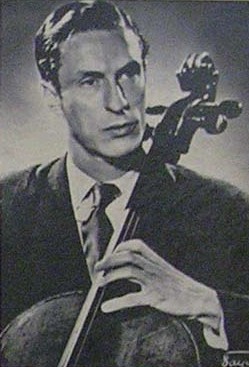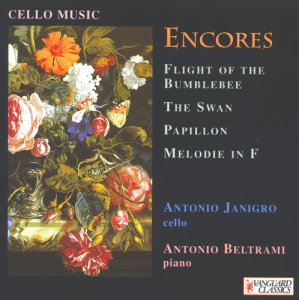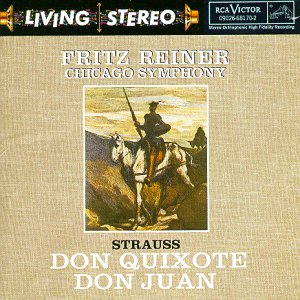| Music Home | Discography | Jacket Images | Korean |
* JANIGRO, Antonio(18th Jan. 1918 ~ 1st May 1989)
[ Incomparable ]
* Curriculum Vitae

3 Photo ; Fayer Studio, Wien (from the front jacket of Vivaldi's Sonata)
Performer's present fame is not always proportional to his genuine ability. It can be said so, in many cases - but there are many exceptions, especially in case that the record label which holds the majority of his recordings is deceased or merged. I think the exemplary cases are Hermann Scherchen and Antonio Janigro, whose major label was Westminster merged to ABC(MCA). Scherchen's recordings are recently excavated by DG and Tahra, but Janigro not.
He was
born at Milan, Italy. He growed in musical family, for
his father wanted to be a concert pianist(but WWI robbed
him of his right arm). Like Pierre Fournier, Antonio began with piano but was
soon enchanted by cello. Fortunately, this change was not
helped by personal unhappiness like Fournier. Such was
his progress that he was able to win an admission of
Verdi Conservatory at Milan. His mother made a chance of
audition by Casals, who recommended Antonio to Diran
Alexanian at Ecole Normale in Paris. Antonio was tutored
by Alexanian from 1934, and many talents was crowded
there. To say nothing of the faculties including Cortot,
Thibaud, Enesco, and Nadia Boulanger, there were Lipatti and Ginette Neveu. Lipatti, who was picked
up after a concour by Cortot, was one of his alumni.
Later, Antonio left a radio recording with Dinu.
Similar to his father whose life was
seriously changed by WWI, WWII also did his life. He
stayed at Yugoslavia in 1939 in vacation when WWII was
broke. Then, Zagreb Conservatory suggested him a position
of its faculty(he was only 21-year-old). He almost
settled to Zagreb from then on and made a big
contribution for the city's music. After WWII, his
international career including not only Europe and North
America but also Japan and South America was begun and
fame as a leading solist followed soon. Erich Kleiber
said about his performance after a concert with him
playing Dvorak's concerto, simply "Incomparable". Westminster label, which
was a rising star in 1950s, contracted him and made many
recordings with him as a main artist.
Very unfortunate to the fans of him as
a cellist, Antonio's main activity was converted to
conductor of Solists di Zagreb. Considering the recording
datas, the solo works seemed to be no more than
secondary. In mid 1960s he conducted Zagreb Radio
Symphony, and later Saarbrucken Radio where his
repertoires are not confined to from baroque to romantic
era - including 20th century's works, e.g. Ligety. 1960s
saw the most active recordings as a conductor to Vanguard
and RCA, but the year 1970 is the last I can trace, of
which reason I don't know. His later activity as a
conductor was Camerata Academica Salzburg but no
performance with the group was recorded as far as I
know(his successor Sandor Vegh left considerably many
recordings).
He spent the last years at Zagreb. I think
he liked the city very much because he returned Milan
only shortly before his death. Personally, he would mourn
seriously if he would know Yugoslavia was ruined and
ridden by racial war in 1990s.
 His music has
special serenity, but instills calm emotion like
concentric wave on water and leaves special taste. Casals' expressiveness(sometimes
excessiveness) and Rostropovich's vast scale is far
different from his. I like his Vivaldi Sonatas very
much - with deep and natural dignity. Sometimes I think
the scale and masculinity is deficient in his
performance, espeically Dvorak's concerto, but it is
maybe against his nature. Bach's suite is proper to his
style, and Beethoven's sonatas are very good! It should
be amazing experience to the people who prefer
Rostropovich/Richter combi.
His music has
special serenity, but instills calm emotion like
concentric wave on water and leaves special taste. Casals' expressiveness(sometimes
excessiveness) and Rostropovich's vast scale is far
different from his. I like his Vivaldi Sonatas very
much - with deep and natural dignity. Sometimes I think
the scale and masculinity is deficient in his
performance, espeically Dvorak's concerto, but it is
maybe against his nature. Bach's suite is proper to his
style, and Beethoven's sonatas are very good! It should
be amazing experience to the people who prefer
Rostropovich/Richter combi.
His recording quantity is beyond imagination
if you know only now available CDs. The holder is
Westminster(early cello repertoire) and RCA/Vanguard in
the era as a conductor of Solists di Zagreb. Of course,
to our unhappiness, most of the stereo recordings are
conducting.
His interpretations includes mosts of the
famous solo and chamber musics in Westminster. Concertos
are Haydn No.2, Boccherini's B flat major, Dvorak,
Bloch's Schelomo and Bruch's Kol Nidrei,
and Sonatas Bach, Vivaldi(as a complete 6 works, the
world-first recording), Beethoven's 5 works(with Carlo
Zecchi. He was also partner of Mainardi in DGG), Brahms' 2 works(with
Badura-Skoda), Shostakovich and Prokofiev(with Eva
Wollman). Schumann's pieces, Arpeggione sonata, 3
Italian sonatas, and small pieces are recorded by
accompaniment of Eugenio Bagnoli. My favorites are Bach
and Vivaldi at first, and next 3 Italian sonatas
including Frescobaldi's Toccata, Boccherini's A major,
and Locatelli's in D major. Veyron-Lacroix's background
is excellent in Bach and Vivaldi, and Antonio's lustrous
and shiny tone is attractive in Italian repertoires. A
radio recording of Dvorak's concerto with Erich Kleiber
exists, but in my opinion it's not the first to be
recommended along with his studio statement with Dixon.
Of course Bach's unaccompanied suites should be
mentioned, which were
released as CD in mid 1990s by MCA, though soon deleted
from catalogue.
He recorded many trio works with Badura-Skoda and
Jean Fournier(elder brother of Pierre). Of course, though
available only as second hand LPs like his other
Westminster issues, Beethoven's 4 works including Archduke,
Brahms No.1, Schubert Nos. 1/2, Dvorak Nos.2/5, Mozart 6
complete works, and Haydn 7 works are recorded. (I do not
get Mozart and Haydn yet.) Young Badura's spontaneousness
and string's dignity is melted to an ensemble.
 His stereo recordings are
mostly conducting. However, his solo skill in this period
is not negligible. Two solo
works at Vanguard are the complete Beethoven Sonatas(with
Demus) and encores album with Beltrami, of which many
contents are re-recording of those in Westminster. These
have good sound quality, and are available as CD at the
present time. Very elegant performances, comparable to
Fournier's masterpieces. At RCA, only an album of
concerto was left, which contains Boccherini B flat major and
2 works of Vivaldi. The former
is second interpretation at studio, which I heard him
first. Unless I had listened Fournier's DG recording
before, this would be the first without hesitation. The
only available RCA recording is 'Don Quixote' with Fritz
Reiner. His another solo fragments at RCA can be heard in
Strings Omnibus album, by Couperin's "Concert
suites" arranged by Bazelaire. About his conducting,
I have little -.-
His stereo recordings are
mostly conducting. However, his solo skill in this period
is not negligible. Two solo
works at Vanguard are the complete Beethoven Sonatas(with
Demus) and encores album with Beltrami, of which many
contents are re-recording of those in Westminster. These
have good sound quality, and are available as CD at the
present time. Very elegant performances, comparable to
Fournier's masterpieces. At RCA, only an album of
concerto was left, which contains Boccherini B flat major and
2 works of Vivaldi. The former
is second interpretation at studio, which I heard him
first. Unless I had listened Fournier's DG recording
before, this would be the first without hesitation. The
only available RCA recording is 'Don Quixote' with Fritz
Reiner. His another solo fragments at RCA can be heard in
Strings Omnibus album, by Couperin's "Concert
suites" arranged by Bazelaire. About his conducting,
I have little -.-
One more; many peoples will perhaps consent to my opinion that Italian cellists were shaded by French school, including great Fournier, Tortelier, Navarra, and Gendron. Famous Italians began with Enrico Mainardi, and Janigro, Amadeo Baldovino can be mentioned. However, total number of solo recordings (except chamber musics more than trio) available now by CD of them is far inferior to that by only Fournier! Frankly speaking, my personal liking is Fournier, but Mainardi or Janigro is NOT inferior in artistic value. Especially, the reason Janigro is less popular than Fournier is much due to the accessibility of records, I think. Westminster label's bankrupcy should be blamed, which is not his artistic value but only his luck. Who will be able to deny firmly "If Janigro had recorded at DG and Fournier at Westminster, Janigro would have far more popularity than now"?
Links
- Antonio Janigro page ; Damir, Antonio's son, running. Photo gallery and board are interesting.
- Antonio Janigro International Cello competition
(c) 2006~ , Youngrok LEE ; Link free, but please get my approval before you reuse, copy, or quote this materials.
| Music Home | Discography | Jacket Images | Korean |
Created ; 7th Feb. 2006
(Original Korean text
; 24th Jan. 2006)